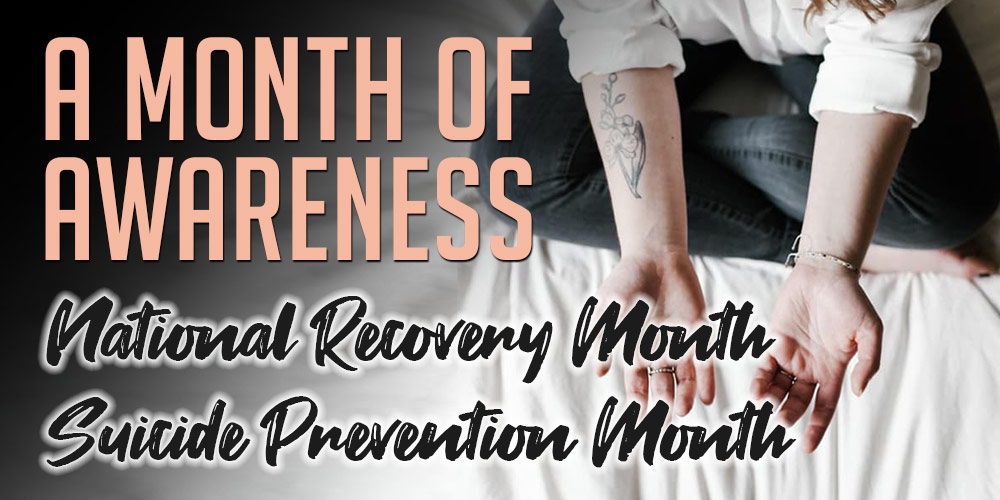
September is National Recovery Month and National Suicide Prevention Month to create awareness about each of these important mental health issues that sometimes intersect.
Let’s begin by giving you some framework on how to best think about addiction.
Imagine a close friend or family member is diagnosed with heart disease. Then, despite the fact that heart disease is a chronic condition with no cure, your loved one goes to great lengths to adjust their lifestyle to improve their health.
They quit smoking, begin working out, eating healthy, taking prescribed medication, attending cardiac rehab, and setting goals.
After some time passes, they experience a setback and require surgery. Would you feel angry at them for the progression of their heart disease? Or would you cheer them on as they recover? Would you be proud of them for their continued hard work or frustrated with their inability to be cured of an incurable disease?
In this hypothetical scenario of heart disease, of course you would be supportive, encouraging, and caring.
But what if your friend or family member was suffering from addiction? Would you respond the same?
The Realities Of Addiction
Addiction is a disease for which we have no cure. Recovery is not a finish line to be crossed… It is an ongoing journey with stages of progress and periods of struggle.
Unfortunately, this can be difficult to understand for those supporting their loved ones in their struggle with addiction.
Contrary to popular belief, recovery from addiction is not a matter of willpower. For those who suffer from substance use disorders, it takes more than good intentions to stop using drugs and alcohol because addiction changes the brain.
The use of drugs and alcohol impairs choice and willpower, meaning an addict’s dependency is often beyond their control. This is why recovery often requires professional treatment and the support, understanding, and encouragement of loved ones.

Why Celebrate Recovery?
The decision to pursue recovery is not an easy one. In a world that stigmatizes addiction, it can be incredibly difficult for those with substance use disorders to acknowledge their dependence, admit that they need help, and seek professional treatment.
While in treatment and during recovery, people must:
- Complete the detoxification process
- Face past traumas
- Overcome their fears
- Rebuild their lives
This is no small feat and requires determination, perseverance, and great strength. From the outside, these accomplishments often go unnoticed as the topic of addiction remains taboo.
Too often, sobriety is regarded as an expectation rather than an accomplishment. For those who suffer from addiction, each step to sobriety is full of physical and mental challenges.
Recovery is much more than a person’s ability to say ‘no’ to substances. It is their dedication to a new way of living.
National Recovery Month
According to the National Association of Addiction Professionals (NAADAC), there are millions of individuals whose lives have been transformed due to recovery.
Unfortunately, many of these are never celebrated by the greater population. This is why National Recovery Month is so important.
Each September, we are given an opportunity to share recovery successes and spread the message that recovery is worth it. By sharing this truth, we hope to reach those struggling with addiction and help them acknowledge their need for treatment.
Through initiatives like National Recovery Month, the awareness surrounding addiction and recovery grows, diminishing the stigma surrounding mental health and addiction.
In time, we are hopeful that this will result in more recovery success stories and fewer substance-related deaths.
Addiction and Suicide
When many people think of addiction related deaths, they typically imagine drug overdoses or other accidents.
But did you know that suicide is also a leading cause of death for those who abuse substances?
While it is impossible to know exactly how many drug-related deaths were accidental and how many were intentional, it is no coincidence that as the rate of suicide increases, so does the rate of addiction.
By reducing the stigma surrounding addiction and recovery, we also reduce the stigma surrounding suicide.
And while we have a ways to go when it comes to combating the taboo nature of mental health disorders, Suicide Prevention Month is another step in the right direction.

The Oro House Approach
September is both National Recovery Month and National Suicide Prevention Month and to the staff at Oro House Recovery Centers, this comes as no coincidence. It is our mission to guide our clients along their journey to recovery, reduce the likelihood of suicide, and break the bonds of stigma.
We understand the increased risk of suicide associated with all mental health disorders, which is why we embrace a treatment model that utilizes dual diagnosis rehab.
By acknowledging the comorbidity of addiction and other mental health disorders, we are able to effectively treat our clients’ substance use disorders and other existing mental conditions that may have contributed to their addiction or resulted from it.
By using this all-angles approach to addiction treatment, we reduce the risk of suicide and show our clients all that is possible in life after drug and alcohol dependency.
We are proud to stand behind National Recovery Month, Suicide Prevention Month, and other initiatives that shed light on the realities of addiction and suicide, and are constantly inspired by our staff and clients who show us that recovery is possible.
Related Posts
- June is PTSD Awareness Month
Because trauma impacts so many people, June is recognized every year as PTSD Awareness Month.…
- Pain Awareness Month in September
September is recognized as Pain Awareness Month to better educate those who deal with pain…
- March is Self-Injury Awareness Month [Self Harm or Cutting]
Numbness, emotional distress and overwhelm can lead people to self harm. For some, self-injury wakes…
